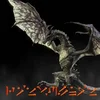While reading a few questions came up you guys may be able to help me with:
Dragonshouts:
- mir vur shaan for battlefury - i can see why valor and inspire are used but loyal? wouldnt battle valor inspire make more sense? or fury valor inspire? why LOYAL?
- call dragon od ah viing. when there is a word for dragon or dragonkind wouldnt it make much more sense to use dov or dovah in a shout to call a dragon? ok a winged snow hunter in skyrim seems to be only a dragon but in theory it could also be an eagle or similiar bird...
- bend will gol hah dov ok dov can be a synonym for dominance though ofc using the word dominance seems more effective to me. but why gol? in all cultues i know of will is described as fiery so wouldnt make yol more sense than gol?
-call of valor hun kaa zool never using the word valor or call. i can somewhat see the idea but hero champion legend could really mean a hell lot of stuff. it could be a shout to increase battle prowess, stamina, or my soccer skills oO
-clear skies lok vah koor...i see why lok is there but spring and summer? what has that to do with a clear sky? in special spring is usually a time of a lot of rain...wouldnt words like clear make more sense in the context? or something like clouds are gone?
- dragon aspect. why wyrm? why not dovah? its like aspect of the wolf ending with pudle.
- drain vitality uses magicka as word? why not actually drain? like this stamina magicka health it could also be a shout to increase all those...its not saying anywhere how these attributes are used.
- fire breath: wouldnt it make much more sense to use the word breath instead of sun?
- slow time - time sand eternity sounds to me like stopping time completly or repeat a certain loop of time. again i am missing the word to slow. this way there is much interpretation possible and the outcome unpredictable
- soul tear: why zombie? i see essence and tear perfectly but zombie? wouldnt death, rend, spirit or something make much more sense?
- throw voice. fool? sounds like "hey 2 words are actually enough to express the idea" "yes but we always used 3 words" "Any idea what word we could use?" "No, lets use a radnom wor generator" how about actually using the word...throw. throw voice far. there you got it...fool ^^
-fus ro dah force push - i see that perfectly and its named that in star wars. why balance? OFF balance would make more sense. again sounds like 2 words were enough but they wanted to make it 3 somehow. i really dont see how balance works out there, there are many better choices that could have been made like force push throw
some insight qwould be appreciated =)



